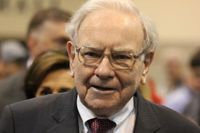On May 3, 2025, Berkshire Hathaway reported its first-quarter results and held its annual shareholder meeting in Omaha, revealing significant financial shifts and strategic decisions. One of the most notable highlights from the earnings release was the company’s remarkable increase in cash, cash equivalents, and short-term Treasury bills, which surged by 84% over the past year, climbing from $188.99 billion as of March 31, 2024, to an impressive $347.68 billion as of March 31, 2025.
Despite this substantial cash reserve, Berkshire Hathaway has opted not to repurchase its own stock for the third consecutive quarter. This decision marks a stark contrast to the previous trend, where the company had maintained a 24-quarter streak of stock buybacks. The pause in buybacks raises questions regarding the company’s valuation and future strategies in a fluctuating market.
Warren Buffett, Berkshire’s CEO, has a history of making strategic decisions regarding capital allocation, often waiting for the right moment to deploy significant capital into promising investments. His approach has been to build up cash reserves during uncertain times, and with the S&P 500 coming off two consecutive years of over 20% gains, it seems prudent for Berkshire to maintain a strong cash position. The current high interest rates also make holding risk-free assets like Treasury bills more appealing.
Buffett has long argued that buybacks serve as a more effective way of returning capital to shareholders than dividends. In fact, Berkshire does not pay dividends at all, a strategy Buffett believes has proven beneficial for long-term stock appreciation. According to Berkshire’s quarterly earnings reports, the company’s stock repurchase program allows for buybacks whenever Buffett determines that the repurchase price is below the company’s intrinsic value, conservatively assessed.
However, buybacks will not occur if they risk reducing Berkshire’s consolidated cash, cash equivalents, and U.S. Treasury bill holdings below $30 billion. With current holdings exceeding 11 times that threshold, the ongoing pause in buybacks suggests that Buffett believes Berkshire’s intrinsic value is currently above his preferred buyback price. Historically, Buffett has authorized buybacks when the company’s book value falls below 1.1, a threshold that has been adjusted over the years.
As Berkshire Hathaway navigates this period of cash accumulation without repurchasing shares, it remains a strong contender in the market, particularly as a safe investment amid economic uncertainties. Many of its controlled assets, particularly its insurance businesses, are U.S.-focused, providing insulation from geopolitical tensions.
During the annual meeting, Buffett also addressed the recent 1% excise tax imposed on stock buybacks by publicly traded companies, indicating that this tax could further deter buybacks in the current economic climate.
While Berkshire Hathaway’s stock may not appear as cheap as it once did, the company’s sound capital allocation strategy and risk management practices make it a viable option for long-term investors. Despite the lack of buybacks, shareholders should not feel compelled to sell; the company is simply prioritizing operating earnings and safeguarding the investments that have been entrusted to its management.
In a related development, Warren Buffett announced his successor as CEO of Berkshire Hathaway during the same meeting, naming Greg Abel as the individual he envisions to take over the helm. This succession plan echoes a similar strategic foresight exhibited by Pope Francis, who passed away on April 21, 2025, at the age of 88. Like Buffett, Pope Francis understood the importance of preparing for the future, ensuring that his progressive agenda would continue through the appointment of like-minded cardinals.
Following Pope Francis’s death, 133 cardinals were sequestered in the Sistine Chapel starting April 30, 2025, to elect the 267th pope. The election led to the elevation of Robert Francis Prevost, now Pope Leo XIV, who had been appointed as a cardinal only in 2023. In his first address from the balcony at St. Peter’s Basilica, Pope Leo XIV emphasized the need for a missionary church that builds bridges and fosters dialogue.
Pope Leo XIV’s election is seen as a gentle gesture toward moderation, with many observers noting that he is broadly considered a liberal. His appointment reflects a continuation of the progressive reforms initiated by Pope Francis, who appointed approximately 80% of the current cardinal electors. This strategic move by Francis was crucial in solidifying his legacy and ensuring that his vision for the Church would persist.
In his address, Pope Leo XIV stated, "To the Church of Rome, a special greeting. We must seek together how to be a missionary church, a church that builds bridges, dialogue, always open to receive — like this square with open arms — everyone, all those who need our charity, our presence, dialogue, love." This message of warmth and inclusivity resonates with the broader goals of the Catholic Church in a rapidly changing world.
The composition of the College of Cardinals reflects a diverse range of backgrounds, with 53 cardinals from Europe, 23 from Asia, 18 from Africa and South America each, 20 from North America, and three from Oceania. The diversity within the ranks of the cardinals is unprecedented, and it signals a shift toward a more inclusive Church.
As Pope Leo XIV begins his papacy, he faces the challenge of maintaining unity within the Church while navigating the complex landscape of modern religious and social issues. His ability to balance liberal and conservative ideals may prove to be his greatest asset, as he seeks to follow in the footsteps of his predecessor while forging his own path.
In conclusion, both Warren Buffett and Pope Leo XIV exemplify the importance of strategic foresight and succession planning in their respective domains. As Berkshire Hathaway continues to build its cash reserves and prepare for the future under new leadership, the Catholic Church embarks on a new chapter with Pope Leo XIV at the helm, poised to embrace the challenges and opportunities that lie ahead.

